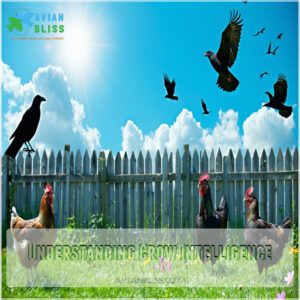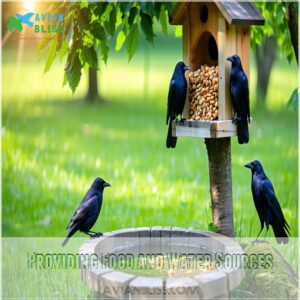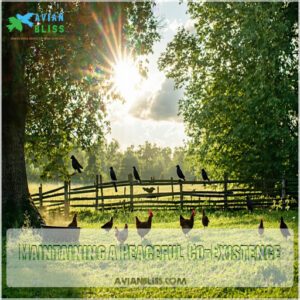This site is supported by our readers. We may earn a commission, at no cost to you, if you purchase through links.

Start by setting up feeding stations near your coop with peanuts, seeds, or mealworms—crows love a good snack.
Add water sources like birdbaths and leave twigs or moss around for nesting materials.
Protect existing crow nests by keeping trees safe from heavy pruning.
Once crows feel at home, they’ll naturally warn of predators with their loud caws, acting as your feathered security team with a food-for-service agreement.
Pay attention to their signals and keep chicken feed separate to avoid conflicts, leveraging their smarts for mutual benefit.
Who says teamwork isn’t for the birds?
Table Of Contents
- Key Takeaways
- Understanding Crow Intelligence
- Creating a Crow-Friendly Environment
- Enlisting Crows as Sentries
- Reinforcing The Crow-Chicken Relationship
- Addressing Potential Concerns
- Frequently Asked Questions (FAQs)
- Will crows protect chickens?
- How do you attract crows specifically?
- How to attract a crow in 4 minutes?
- What is the best animal to guard chickens?
- How many crows are needed to protect chickens effectively?
- What should I feed crows to encourage their presence?
- Will crows attack my chickens or their eggs?
- How long does it take for crows to start protecting chickens?
- Can crows deter all types of predators threatening chickens?
- How do crows and roosters interact as protectors?
- Conclusion
Key Takeaways
- Offer consistent food sources like peanuts, seeds, and mealworms, and provide water stations to attract and retain crows.
- Place nesting materials such as twigs and moss in accessible spots, and protect existing nests by minimizing tree pruning.
- Pay attention to crow alarm calls and behavior—they’ll warn you of predators near the coop and help keep your chickens safe.
- Keep chicken feed separate to avoid conflicts, and manage crow population with careful feeding and habitat control to maintain balance.
Understanding Crow Intelligence
Crows are smarter than you’d guess, showing off intelligent behavior that could rival primates.
Their memory capacity lets them remember faces, even holding grudges, which is both impressive and a little intimidating.
In the area of problem-solving, these birds are master strategists, using tools like tiny DIY geniuses.
They thrive on social learning, picking up tricks from others in their flock.
Add their unshakable adaptation strategies, and you’ve got feathered friends worth inviting to your backyard.
Their advanced cognitive abilities make them highly efficient in various tasks, from foraging to communication.
Creating a Crow-Friendly Environment
You can attract crows by making your yard a welcoming spot with food, water, and safe nesting areas.
It’s like throwing a party they can’t resist, but you’re offering peanuts and nesting twigs instead of snacks and music.
Providing Food and Water Sources
Attracting crows means keeping them fed and hydrated.
Use crow feeders with a mix of seeds, peanuts, and suet.
Scatter mealworms or corn to keep them coming back.
Set up water stations like deep bird baths for drinking and bathing.
Stick to consistent feeding schedules—crows remember generosity!
A little planning creates a reliable, crow-friendly environment.
To further enhance their experience, consider creating a crow friendly space that incorporates various elements to attract and retain these intelligent birds.
Offering Nesting Materials
When building a crow-friendly environment, place nesting materials like twigs, moss, and fibers in ideal spots.
Use accessible locations with good visibility.
Try these placement ideas:
| Material | Suggestion 1 | Suggestion 2 |
|---|---|---|
| Twigs | Shed roof | Tree branches |
| Moss | Brush piles | Planter edges |
| Soft fibers | Dispensers | Wooden platforms |
Nesting attracts crows, improving your flock’s security naturally.
Installing crow nesting boxes can also enhance the attractiveness of your environment to these birds.
Protecting Existing Crow Nests
To guarantee crow nests stay safe and inviting, focus on nest placement and tree selection.
Keep nests high in sturdy trees, away from disturbances.
Maintain crow habitat by pruning gently to preserve cover.
Use nest materials that blend in naturally.
Boost nest safety with wildlife corridors connecting your coop, helping crows patrol effectively.
Supporting crow conservation strengthens their role in protecting poultry.
Understanding proper crow nest boxes design is vital for creating an appealing and secure environment for the crows.
Enlisting Crows as Sentries
You can train crows to act as sentries by recognizing their alarm calls and observing their behavior around predators.
With patience and small rewards, they’ll warn your flock of danger and even help chase away hawks.
Recognizing Crow Warning Calls
Understanding warning call patterns is like tuning into nature’s alarm clock.
Crows use loud, rapid caws to signal hawks or other threats.
Researchers suggest the number of distinct crow calls may exceed twenty, adding complexity to their vocalizations, as detailed on a crow language webpage.
These predator alarm signals protect their flock—and yours.
Study their vocal communication to strengthen your crow alert system.
Here’s a quick guide:
| Sound | Meaning | Action |
|---|---|---|
| Rapid caws | Predator nearby | Check chicken coop immediately |
| Soft gurgles | Relaxed and safe | No immediate danger |
| Chuckling | Possible deception or courtship | Monitor behavior for unusual cues |
By mastering crow intelligence, you’ll boost flock safety and spot threats early.
Responding to Crow Behavior
Crows don’t just yell for fun—those alarm calls mean business.
When you hear their racket or see them swirling and diving, it’s time to act fast.
Predators are likely nearby, and your chickens could be in danger.
- Listen for loud, repeated caws signaling trouble.
- Watch for frantic wing-flapping or dive-bombing.
- Quickly check your flock and secure vulnerable chickens to prevent a potential attack.
Reinforcing The Crow-Chicken Relationship
You’ll strengthen the crow-chicken bond by keeping their interactions calm and positive.
Make sure crows have what they need, like food, space, and protection, so they’ll stick around and keep helping.
Maintaining a Peaceful Co-Existence
Striking that sweet balance between crows and chickens takes effort, but it’s doable.
Always be on the lookout for tension or clashes. Give enough food, water, and space to avoid drama. Build trust with a steady feeding schedule. Keep adapting—you’ll notice changes as the flock grows.
- Observe crow-chicken interactions daily.
- Provide ample resources to prevent fights.
- Reinforce trust with feeding routines.
- Shift strategies as relationships evolve.
Introducing New Flock Members
Introducing new flock members takes patience and careful planning, as crows will quickly pick up on the changes.
Let crows observe their arrival—they’ll pick up on the changes fast, which helps in easing the flock hierarchy adjustment.
Use gradual socialization strategies to ease the flock hierarchy adjustment, as a chicken flock’s social dynamics are complex and influenced by several factors.
A chicken flock’s social dynamics are complex and influenced by several factors, making it essential to understand and manage them effectively.
Here’s a quick guide to managing these dynamics:
| Aspect | What to Watch For | Why It Matters | Best Practice | Crow Reaction |
|---|---|---|---|---|
| New Chickens | Size & health | Avoid aggression | Group introductions | Familiarity builds |
| Flock Dynamics | Aggressive behavior | Keeps order stable | Supervise closely | Situational learning |
| Feeding | Resource access | Prevent competition | Add extra feeders | Recognizes hierarchy |
| Observation Time | Consistent exposure | Builds trust | Allow daily viewing | Accepts new members |
| Crow Engagement | Warning call use | Flock safety | Respond immediately | Confirms cooperation |
With time, crows will adopt the new members into their vigilant watch, ensuring a stable and harmonious flock environment.
Addressing Potential Concerns
You might worry about crows becoming too noisy or taking over your yard.
Don’t stress—simple steps can keep the balance and make your flock’s new guardians a manageable presence.
Managing Crow Population Growth
Keeping crow benefits without letting their numbers spiral can be a balancing act.
Manage their growth patterns smartly:
- Ease up on feeding to support natural foraging habits.
- Trim back trees to reduce nesting sites.
- Shift crowded nests to thin out large colonies.
- Keep an eye out for population spikes and adjust as needed.
If you’re concerned about crows impacting other bird species, consider implementing effective crow-deterrent strategies around vulnerable nests.
Good crow management keeps your crow-chicken relationship thriving!
Dealing With Excessive Noise
When crow noise gets too loud, a few tweaks can restore your peace.
Use acoustic barriers or thick vegetation like evergreens to absorb crow sounds.
Place feeding stations farther from your home to create quiet hours.
If that’s not enough, try sonic deterrents or audio masks for relief.
With thoughtful planning, you’ll keep crows’ protection without losing all tranquility.
Frequently Asked Questions (FAQs)
Will crows protect chickens?
Did you know crows can spot a hawk from over a mile away?
They’ll mob predators and sound alarms, helping to protect your chickens.
But don’t expect miracles—young chicks and eggs might still need backup.
How do you attract crows specifically?
Leave some peanuts or corn scattered outside, toss in shiny objects like foil, and set up water nearby.
Crows love spotting easy snacks and treasure. Bonus points if they find cat food or mice!
How to attract a crow in 4 minutes?
Toss out cat food or peanuts, scatter shiny objects like foil, and play crow calls from your phone speaker.
Crows love consistency, so they’ll respond quickly if it looks like a free buffet.
What is the best animal to guard chickens?
Imagine a fearless bodyguard in feathers—geese are your best bet.
Their loud honking scares off predators while staying loyal to their flock.
Tough, loud, and alert, they’ll watch over your chickens like hawk-eyed sentinels.
How many crows are needed to protect chickens effectively?
You’ll need at least three to five crows consistently around to offer decent protection for chickens.
They act as your aerial security team, warning of hawks and mobbing predators, but they don’t work 24/
What should I feed crows to encourage their presence?
Offer crows food they can’t resist, like unsalted peanuts, cat food, or fresh scraps.
Sprinkle shiny objects nearby for extra appeal.
Keep it consistent and they’ll make your place their new favorite hangout.
Will crows attack my chickens or their eggs?
Crows rarely attack adult chickens but might go after chicks or eggs, especially if they’re easy to access.
Protect your eggs and young birds with covered coops or mesh—it’s better safe than sorry!
How long does it take for crows to start protecting chickens?
It won’t happen overnight, but within a week or two of providing food and a safe environment, crows often start hanging around.
Once they trust you, their protective instincts naturally kick in.
Can crows deter all types of predators threatening chickens?
Not every predator backs down to crows.
They’re great at mobbing hawks, but some species, like raccoons or foxes, don’t care.
Think of crows as your alarm system, not an all-in-one shield.
How do crows and roosters interact as protectors?
Did you know roosters can spot predators over 50 yards away?
While roosters sound alarms and defend physically, crows add aerial vigilance, mobbing hawks.
Together, they’re like your backyard’s dynamic duo of chicken protectors!
Conclusion
Think of attracting crows to protect chickens as building a mutual partnership.
By offering food, water, and nesting spots, you invite these clever birds to stick around.
In return, their sharp eyes and warning calls keep your chickens safe from predators.
Just keep chicken feed separate to avoid squabbles and monitor crow activity to prevent overpopulation.
With a little effort, you’ll create a natural defense system—turning crows into your coop’s watchful, feathered guardians.
- https://www.backyardchickens.com/threads/attracting-crows-for-protection.1157580/
- https://permies.com/t/7767/attracting-crows-repell-hawks
- https://www.mypetchicken.com/blogs/faqs/would-crows-ever-attack-or-eat-my-chickens
- https://edgwickfarm.wordpress.com/2013/12/05/crows-and-chickens/
- https://bestfarmanimals.com/protect-your-chickens-from-hawks-without-great-expense/











